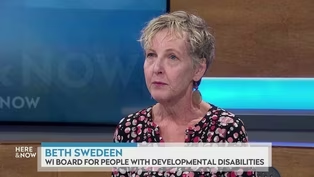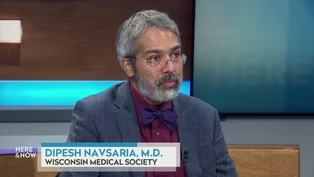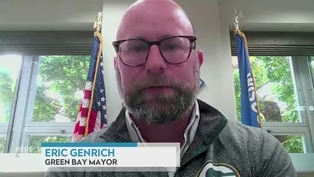Here and Now
Monique Minkens on Domestic Violence Homicides in Wisconsin
Clip: Season 2400 Episode 2415 | 16m 23sVideo has Closed Captions
Monique Minkens on Wisconsin's record number of domestic violence-related homicides.
End Domestic Abuse Wisconsin Executive Director Monique Minkens considers the state's record number of domestic violence-related homicides and how funding cuts and housing are factors in this problem.
Problems playing video? | Closed Captioning Feedback
Problems playing video? | Closed Captioning Feedback
Here and Now is a local public television program presented by PBS Wisconsin
Here and Now
Monique Minkens on Domestic Violence Homicides in Wisconsin
Clip: Season 2400 Episode 2415 | 16m 23sVideo has Closed Captions
End Domestic Abuse Wisconsin Executive Director Monique Minkens considers the state's record number of domestic violence-related homicides and how funding cuts and housing are factors in this problem.
Problems playing video? | Closed Captioning Feedback
How to Watch Here and Now
Here and Now is available to stream on pbs.org and the free PBS App, available on iPhone, Apple TV, Android TV, Android smartphones, Amazon Fire TV, Amazon Fire Tablet, Roku, Samsung Smart TV, and Vizio.
Providing Support for PBS.org
Learn Moreabout PBS online sponsorship>> Across Wisconsin, a record number of people died as a result of domestic violence in 2024, according to an annual report released this month.
End Domestic Abuse Wisconsin reports 110 victims in 2024, up from 85 the year before, 60% of the homicides happened in urban areas, 40% in rural, and firearms were used in 71% of the deaths, with 78% of the perpetrators being men.
What is causing the jump in domestic violence and what to do about it?
We're joined by Monique Minkins, executive director of End Domestic Abuse Wisconsin, and thanks so much for being here.
>> Thank you for having me.
>> Well, to that question, what is causing domestic violence to be on the rise?
>> Mm-hmm.
There are several reasons why.
Anytime there is an an economic downturn, there is domestic violence because of life stressors.
And so, we know that we have been in this, I don't know if you call it a recession or whatever, but food prices are rising.
Prices are rising in general, unemployment is rising, and that causes a lot of stress in the family.
And so, that can be a cause of the rise.
Sometimes, it's also the fact that programs are underfunded and we are trying to serve as many people as we can, and sometimes there are wait lists or people decide not to pursue the services.
And so, it's a matter of access to services as well as economics that play an important role in why these numbers are rising.
This is the worst yet.
>> Yeah.
So, as to that funding, according to your report, last year, federal Victims of Crime Act funding in Wisconsin to Wisconsin dropped by 70%, from $44.5 million to $13 million.
Why is this funding shortfall happening?
>> Mm-hmm.
The shortfall is happening, this VOCA's fund that through the Crime Victims Fund, and the Crime Victims Fund is funded from crime fines and corporate crime is lucrative, I guess, for the Crime Victims Fund.
And as those, as depending on the administration, let's say, some deregulated, different policies and so forth, which lessened the amount of the money going into the Crime Victims Fund.
Recently, there was someone who was fined $100 million and that person received a pardon.
And there was another gentleman fined over $400 million and also received a pardon.
And so, that means money's not going into the Crime Victims Fund.
And so, there was a VOCA fix by President Biden, and it's slowly climbing, and yet with the increase and the rate that the Crime Victims Fund is regenerating, it's not very helpful.
I know that the legislature recently added money to the fund and still, it's low.
And $13 million across the state of Wisconsin is really low when you think about how, oh, probably 70 to 80% of program's budget is VOCA funding.
And so, there are a lot of things that threaten our funding on both the state and federal level.
>> Because what could more funding do?
What would it go toward?
>> Oh my goodness.
It would go towards services to victims.
Some programs have limited their hours.
They have discontinued some of their services and they added those services because they thought they would be really helpful to victims.
And so, now, those services are no longer available.
Helplines have closed down.
I know one program, nine staff members are no longer a part of that program because of budget cuts.
70% of the programs cut services.
And so, you can't help but notice that.
Additionally, 80% of those programs have now have staffing issues.
And since COVID, we have always had staffing issues and they've been compounded.
If you imagine someone worried about whether they'll get paid or not, or having to let someone go, and then the rest of the staff stand behind and panicking because people have families, they have rent to pay, they have expenses, life expenses that they need to cover.
And so, it contributes to it.
>> Hearkening back to our last segment in this program and affordable housing, how do housing needs play into domestic violence response?
>> Housing is homicide prevention.
That's it.
That's all is housing prevention.
And the majority of homeless women and children are homeless due to domestic violence.
And so, we have to understand the role that it plays and how someone leaves and it's almost a vow of poverty.
And we have to serve each individual according to who they are, realizing that we have to have many options and that housing is expensive and it's hard to get in.
And there are stricter requirements that can sometimes be difficult for people to find housing.
[Sighs] Over the past three years, we've been piloting this Housing First program and we've been seeing excellent results.
And Housing First is like a divergent program.
It makes sure that people are getting what they need and lots of times, it allows them to stay in their home.
And so, we are seeing that like the one thing we purchased for someone was a key, $6 for a key, to her home.
Or we have helped people pay their utility bills because they were behind.
Maybe their partner didn't pay the bill and left them with that bill.
And so, we are looking at different methods because housing, like I said, is homicide prevention.
And people are safer in their home when it's their home and they control who comes in and out.
>> Your report notes that Black women are six times more likely to be killed than white women.
What do you wanna see in response to that, and would it mitigate this disparity?
>> Black women are six times more likely nationally to die of homicide.
In a state of Wisconsin, they are 20 times more likely to die of homicide in the state of Wisconsin.
And there are several factors.
Those are underserved populations.
And VAWA, which is the bill that kind of legitimized domestic violence for a lot of people, it was created, the way it was created involved the police.
It criminalized domestic violence when it should have been a human issue.
And so, there were people when VAWA was being penned, there were Black women there, there were queer women there, and people from other underserved populations, and their voices were drowned out.
And so, VAWA, domestic violence was criminalized and that involved the police.
The police have a role for some people, but not for everyone.
And we have to recognize that, we have to respect that and make sure that there are different methods of people accessing services and not making it tough or creating barriers, or criticizing people for the way they do access those services.
Additionally, I wanna share that we are working with Representative Shelia Stubbs to start a Missing and Murdered African American Women and Girls Task Force.
And we are hoping that that will get us to the root of what the problem is.
Like, we talked about 6% nationally, 20 times more likely to die of homicide in Wisconsin.
There are at least 100,000 women and girls missing nationally, Black women and girls missing nationally.
And so, I would consider it a fire and we need to make sure that we are paying attention to different populations.
This year was the first time we counted where a homicide victim was killed at the hands of the police.
It was a queer man and this person called for help and was killed.
And so, we have to look at all of these things and make sure that there is understanding of what it means to work with different populations and realize once again, the police play a role, but not for everyone.
And for us to try and force people to work with the police is a tragedy and it will not get us anywhere.
We can't arrest ourselves out of domestic violence.
And for some people, that's not an option.
And we have to honor that and work with them accordingly.
>> What can be done to address root causes do you think?
>> For Black women or domestic violence in general?
>> Domestic violence in general.
>> Mm.
Okay.
We have to take that individual approach to domestic violence, and once again, consider identity and life experiences.
And wanting to reiterate, police do play a role for some people and not for everyone.
And that must be hard to think that people are afraid of the police, but there are people who are afraid of the police and don't trust the police, and we have to honor that that may not be a part of their role to liberation.
And so, we have to honor that.
I think about in 2023, in Milwaukee, there were 27 DV homicides.
Milwaukee has a high-risk assessment team.
None of the 27 were on the radar of that high-risk team.
And this is the case in large part because they weren't involved with the police.
And so, we have to consider all avenues of serving victims because people are individuals with different life experiences.
And of course, we need more funding.
I can't stress that enough.
People are losing.
We have lost a lot of funding and we are seeing the results of that.
We have a TA line and victims are starting to call our TA line when they can't get services from their local programs.
And we are able to connect them to other programs and sometimes they wanna know how can they be safe and are in need of moral support that we are giving them.
And we are seeing a huge increase of calls from victims.
>> I want to just back up a little bit and unpack the idea that people may not be comfortable with interacting with police, even as they are victims of domestic violence.
That has to do with not wanting to make a call to involve police that will then bring the entire family into that.
>> Well, there's a lot, right?
They don't wanna bring the family into it.
Some apartment buildings that the police come and it's a habit or someone reports it, people can have been evicted and there is real mistrust.
People want the violence to stop.
They don't want their partners locked up and sometimes their partners get locked up.
And if you are a two-family household, that's really difficult.
There are also times when the harm-doer is killed by the police and that's the last thing anyone wants.
And if we think about the rate of Black men being killed by police, Black and brown men, Native men being killed by the police, we know that the number is high compared to the populations of those communities.
And so, we have to realize that and take that into consideration where some people are honestly afraid of the police and don't trust the police.
And forcing them to work with them is not the answer.
And yet, we have to face it head on and figure out what the problem is.
>> We leave it there.
Monique Minkins, thank you so much.
>> Thank you.
Beth Swedeen on Federal Cuts to Special Education Funding
Video has Closed Captions
Clip: S2400 Ep2415 | 6m 9s | Beth Swedeen on impacts of the U.S. Department of Education cuts on special education. (6m 9s)
Dr. Dipesh Navsaria on Food Insecurity and Children's Health
Clip: S2400 Ep2415 | 5m 19s | Dipesh Navsaria on impacts of food assistance on nutrition and mental health of children. (5m 19s)
Here & Now opening for October 17, 2025
Video has Closed Captions
Clip: S2400 Ep2415 | 1m 9s | The introduction to the October 17, 2025 episode of Here & Now. (1m 9s)
Mayor Eric Genrich on The Green Bay Housing Partnership
Video has Closed Captions
Clip: S2400 Ep2415 | 7m 26s | Eric Genrich on lowering barriers to owning a home by leasing land to reduce mortgages. (7m 26s)
Providing Support for PBS.org
Learn Moreabout PBS online sponsorship
- News and Public Affairs

Top journalists deliver compelling original analysis of the hour's headlines.

- News and Public Affairs

FRONTLINE is investigative journalism that questions, explains and changes our world.












Support for PBS provided by:
Here and Now is a local public television program presented by PBS Wisconsin



